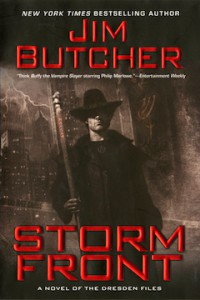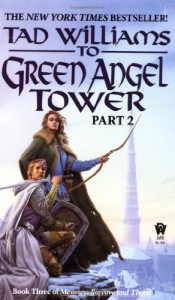All the Time in the World
My taste in reading material is wide and varied: SF/fantasy/"speculative fiction", mysteries (police procedurals, mostly), history, fanfic, straight fiction, smutty vampire books, biographies, poetry, cereal boxes, assembly instructions, the fine print, and your mind.
The Republic of Thieves
 I think I need to add a bookshelf for "superlative snark."
I think I need to add a bookshelf for "superlative snark."I don't have the energy right now to properly review this, but let me just say that Scott Lynch gives me hope for the genre. His characters are smart (but not genius, never make a misstep smart) and human and hilarious and Lynch especially does a beautiful job of creating female characters who are anything but caricatures. I love Sabetha as much as I expected to (after a huge build up thru the 1st two books as Locke's one true love) and I loved the reconciliation between the two of them.
A little concerned re the big reveal about Locke's background and where that will be taken in future books, but I'm sure it will be interesting if nothing else.
Bridge of Souls
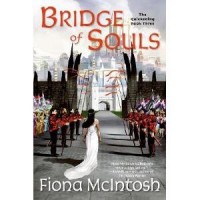 Meh. I'm not sure whether the third book was actually better than the prior two, or if my tolerance for magical dogs and sentient underbrush and the vagaries of a killing curse just went up after this long an exposure.
Meh. I'm not sure whether the third book was actually better than the prior two, or if my tolerance for magical dogs and sentient underbrush and the vagaries of a killing curse just went up after this long an exposure. I think the writing was better. Some. There were still some pretty epicly cringe-worthy moments, though.
Myrren's Gift (The Quickening, Book 1)
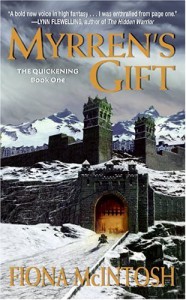 I am so disappointed in this book and its sequel (and I'm assuming will be equally disappointed w/ the third one, but hey, I spent the money on it, I'm going to read it.)
I am so disappointed in this book and its sequel (and I'm assuming will be equally disappointed w/ the third one, but hey, I spent the money on it, I'm going to read it.)First off, a glowing recommendation by Robin Hobb, author of TWO of my favorite fantasy trilogies (Farseer, Tawny Man). What a damn lie. Hobb is an amazing writer and I can't imagine she would honestly rave about this trite piece of barely-adequate crap. I should know better than ever go by rave author blurbs (except Harlan Ellison. I think Ellison would be outraged by the idea of puffing a book he didn't actually like.)
Secondly, the transparently telegraphed set ups - i.e., "He left this meaningful bracelet tied to a branch in the middle of absolutely nowhere in hopes that XYZ character, who would know what it meant, would come along that EXACT PATH to the far back of beyond and see it and understand that he had been there and would follow him." AND LO AND BEHOLD THAT'S EXACTLY WHAT HAPPENS. I know! I am just as stunned as you are.
And there's a fucking magical dog. Which understands human speech and can communicate on a rudimentary level (like barking once as confirmation.) And apparently can on occasion transport itself from point to point. And may be able to transport humans in a similar fashion, although the details are still murky on that. (The dog's abilities are becoming more numerous as the story goes on.) It's fantasy Lassie, man.
And there there's a mass of piddly little kvetches, like using the word "boon" twice in one paragraph, and the second time it's not even really the right word. WHERE WERE THE COPY EDITORS???
Gah. The more I think about it the more I think two stars is overly generous.
Moonraker's Bride
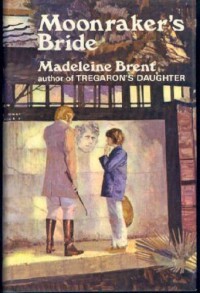 I have no idea if this was a well-written book or not, but nearly 40 years after I first read it (I was about 13 yrs old) it has stayed with me - therefore the 4 stars.
I have no idea if this was a well-written book or not, but nearly 40 years after I first read it (I was about 13 yrs old) it has stayed with me - therefore the 4 stars.
Dragon's Treasure
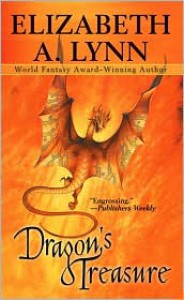 So torn about this one. It's very much a middle book, although it had been so long since I read Dragon Winter that I remembered very little about it, and relied on the strength of Lynn's worldbuilding to pull me back in. (She did, beautifully.) Her writing is so lyrical, and she crafts such complex relationships in spare prose, I can't NOT read anything she's written.
So torn about this one. It's very much a middle book, although it had been so long since I read Dragon Winter that I remembered very little about it, and relied on the strength of Lynn's worldbuilding to pull me back in. (She did, beautifully.) Her writing is so lyrical, and she crafts such complex relationships in spare prose, I can't NOT read anything she's written. Here's the frustrating thing about the book: It just leaves you hanging, and even more so than most fantasy-epic offerings. It took 6 years for her to follow up DW, and it's now been 10 years since DT. I had actually been under the impression that this was just a dualogy, but about 100 pgs from the end realized that no, it wasn't going to wrap up by book's end, and I have to wonder what her publisher's doing - have they given up? is there ever going to be a concluding book? and WHY do I always fall in love with authors/stories that end up dragging on for decades without resolution???
Knots and Crosses
 One of Rankin's first books, and to be honest, it reads like it's from a young author. But there's something so electric and headlong about it, I loved it. The edition I read was published in conjunction with the book's 20th anniversary, with a foreword by Rankin talking about who he was at the time, and the inspiration for/circumstances around the writing and publication of the book, which was great to get the background. (I don't always love things like that, but in this instance it was really good.)
One of Rankin's first books, and to be honest, it reads like it's from a young author. But there's something so electric and headlong about it, I loved it. The edition I read was published in conjunction with the book's 20th anniversary, with a foreword by Rankin talking about who he was at the time, and the inspiration for/circumstances around the writing and publication of the book, which was great to get the background. (I don't always love things like that, but in this instance it was really good.) Some indelible phrases in there as well, like, "She smelt good, like a baby on a fireside towel." What the hell does that even mean? but yet, there it is, stuck in my head.
Thought the identification of the culprit and the mystery's resolution were a little too pat, but hey, it's a book of under 300 pages, it wasn't like there was a ton of time to drag it all out. And given that Rankin (according to the foreword) never foresaw this as book 1 of a series (now something like 20 books, seriously) and actually planned not to have Rebus even survive the book, it was probably as much a matter of style as anything else.
Worth checking out, I think, even if you don't plan to go any further with the series.
The Lamplighter
 I... just don't even know where to begin with this one. Initially reads as a fairly straightforward historical mystery, when a series of gruesome and bestial murders hits 1880s Edinburgh. Self-absorbed police Inspector Groves, who often seems more interested in how a case will be presented to future readers of his memoir-in-progress, suspects that the crimes are tied together through an odd young woman, Evelyn Todd, but resistance to his questioning by Evelyn herself, as well as the associates of the murdered men, stymies his investigation.
I... just don't even know where to begin with this one. Initially reads as a fairly straightforward historical mystery, when a series of gruesome and bestial murders hits 1880s Edinburgh. Self-absorbed police Inspector Groves, who often seems more interested in how a case will be presented to future readers of his memoir-in-progress, suspects that the crimes are tied together through an odd young woman, Evelyn Todd, but resistance to his questioning by Evelyn herself, as well as the associates of the murdered men, stymies his investigation. Meanwhile, Professor McKnight and Mr. Canavan, whose unexpected friendship has developed around a shared love of books and philosophy, take up their own investigation into Miss Todd's background and experiences, hoping to discover what links her to the deaths of such a varied cast of characters, the mighty and the seedy.
Evelyn's vast imagination, it ensues, is capable of somehow manifesting her desires as she sleeps. Better still, it seems that it unleashes a silent "lodger" who occupies her mind and is freed only when she is unconscious. What and who is that "lodger"? how did it come to share her mind, and why are these particular people its targets? The last quarter of the book becomes increasingly phantasmical, requiring the reader to set aside any requirements for a tidy wrap-up.
King Suckerman
 Way too much pop culture immersion in this one for me, which is funny, because that's one of the things I appreciate about Pelecanos - his ability to evoke a particular time and place by what was in the air music- and culture-wise.
Way too much pop culture immersion in this one for me, which is funny, because that's one of the things I appreciate about Pelecanos - his ability to evoke a particular time and place by what was in the air music- and culture-wise. Basically, King Suckerman is the story of a regular guy who, having sown his own wild oats and left those days behind, makes a dumb move and gets caught up in something far worse than he anticipated. His best friend is a sort of ne'er-do-well party guy and playboy whose behavior is more than a little responsible for the two of them falling into a bad situation and not knowing quite how to get out of it.
The bad guys in this one are particularly brutal, IMO, and that made it somewhat difficult to read. In his books that I've read thus far, Pelecanos mostly makes the bad guys part of the scenery - they're not soft-pedaled, but you don't get repeated instances of having their brutality thrust in your face. Not the case with this one, so be warned if you've got a low tolerance for such things.
The Dragonbone Chair
 I'm positive I read this book, oh, probably 15 or more years ago now, but I have to say that virtually none of it sparked any kind of recollection. All I remembered was that I read the first one, and I think the second, but never got around to reading the third. Which is usually a pretty good indication that it wasn't really thrilling me, if I didn't feel compelled to finish the series.
I'm positive I read this book, oh, probably 15 or more years ago now, but I have to say that virtually none of it sparked any kind of recollection. All I remembered was that I read the first one, and I think the second, but never got around to reading the third. Which is usually a pretty good indication that it wasn't really thrilling me, if I didn't feel compelled to finish the series.1) I read in someone else's review that the book didn't really take off until around 150 pages in -- I would go so far as to say 200. That's just plain ridiculous. This is the 20th anniversary edition (I think - maybe 15th? - anyway) and Williams in his foreword says that his initial thought was that this would be a single, stand-alone book, but his editors laughed at him and said, "your OUTLINE was 125 pages, and it included notes like 'and then some other stuff happens that I haven't quite worked out yet.'" Much of the girth of The Dragonbone Chair, IMHO, could be greatly reduced if someone had taken a firm hand with Williams and said, really, no one wants to slog through this much set-decoration. Protagonist Simon spends probably 100 pages trudging around the Hayholt, musing about the crumbling abandoned parts of the castle and avoiding doing any work. It isn't until he is forced to leave the castle that he begins to develop a spine and some interest in something other than his own next meal; simultaneously, the story begins to move, and my interest grew substantially.
2) There are several points at which Simon is vaguely reminded of something that will eventually prove important - e.g., he has a vision of his friend Marya in the company of a short, bald monk who seems familiar. Well, of course he does - Simon has already met the man twice. Sure, Simon is prominently identified as a "mooncalf" (i.e., space cadet) but really? he *still* can't put a name/identity to that face? It's just such a fake-out way of delaying having the information come out. Likewise his inability to remember having encountered Ineluki's Red Hand and the sword Sorrow in the lichyard outside the castle - that is slightly more understandable, as he was pretty traumatized by the experience.
The Cloud Roads
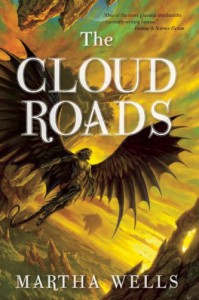 Not really Wells' best work, IMO, but still head & shoulders above most of what's out there.
Not really Wells' best work, IMO, but still head & shoulders above most of what's out there. Moon is a shapeshifter, living among yet another group of humanoid "groundlings" and hiding his other-ness, as he has done for many years, ever since his mother and siblings were killed. Every time he starts to get comfortable, someone discovers he's different, and he has to move on, usually in a big hurry - unfortunately, there's a race of malevolent shapeshifters called the Fell that regularly prey on groundling communities, and Moon has the misfortune to resemble, in his other form, the ruling type of Fell. Moon doesn't know *what* he is, but he knows he's not one of them.
By the way, Moon's other form is dragon-ish. Think wings and claws. So although he's not evil, it's easy to see why his transformational abilities make his neighbors nervous.
Unmasked once more and about to be executed, Moon is rescued by a huge, winged monster - Stone, who turns out to be an elder of Moon's own race, whom he tells Moon are called the Raksura. But Moon is skeptical of trusting Stone - too many instances where letting his guard down the slightest bit has meant loss of any safe haven, and usually physical danger. Dispossessed, and understandably curious, he accompanies Stone on his journey homeward. There, Moon is introduced to the two classes of creatures that constitute the Raksura: the Aeriat, winged warriors and rulers; and the Arbora, non-winged hunters, teachers, soldiers, artisans, and "mentors" (a sort of shaman/healer class that also act as advisors to the queens and their consorts), and discovers that Stone has a hidden agenda for bringing him there.
The "orphan's quest for identity" is a fairly standard fantasy theme - Wells' strength here is the unusual societies she has created. Would have preferred a bit more time and care spent on fleshing out the personalities of the various main characters, but overall, very satisfying.
The Girls' Guide to Hunting and Fishing
 I first encountered "The Girls' Guide to Hunting and Fishing" via Selective Shorts on NPR, and loved it so much I had to get the book. It's the best thing in the collection, and still a favorite.
I first encountered "The Girls' Guide to Hunting and Fishing" via Selective Shorts on NPR, and loved it so much I had to get the book. It's the best thing in the collection, and still a favorite.


